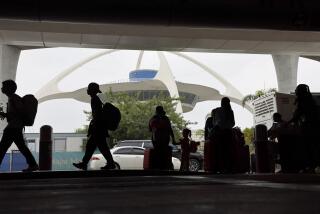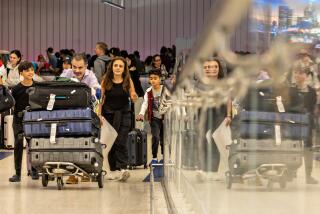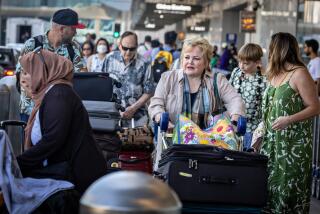TSA logs 1 million users of PreCheck program
The Transportation Security Administration reached what seems like a lofty milestone last week when it announced it had screened 1 million passengers through a new accelerated security program at airports across the country.
But the TSA acknowledges that the new security program, dubbed PreCheck, has served only a small fraction of the nationâs air travelers.
The TSA screens an estimated 1.8 million passengers a day at 450 commercial airports. That means that in the same time that the PreCheck program screened 1 million passengers since it launched in October, the TSA has processed nearly 335 million passengers.
âIn the context, 1 million is a very, very small number,â said Chris McLaughlin, assistant administrator for security operations at TSA. He added that the benefits of PreCheck to accelerate the overall system are still too small to calculate.
The PreCheck program operates at only 14 airports and is open to pre-approved passengers of three airlines: American, Delta and Alaska. PreCheck lets travelers who volunteer background information to the TSA ahead of time go through special screening lanes without removing shoes, belts and coats. It cuts the estimated screening time as much as 50% for those who use it.
The overall system will benefit, the TSA says, because PreCheck passengers are pulled out of the regular screening lines, making them shorter.
McLaughlin said PreCheck will have a bigger effect in the near future. It is scheduled to expand to a total of 35 of the nationâs biggest airports by the end of 2012. Those airports serve as much as 90% of the nationâs travelers, he noted.
âBy the end of this calendar year, we will be at a place where PreCheck will be contributing positively to the overall system,â McLaughlin said.
Spirit Airlines hikes carry-on fees
Spirit Airlines Inc. has taken harsh criticism in the last month for its penny-pinching ways, but the Florida carrier continues to expand its network and collect sizable profit.
Passenger-rights groups cried foul last week when Spirit announced that starting Nov. 6, the cost to bring a carry-on bag on a flight will be $100 when paid at the gate â more than double the $45 fee now. Spirit also raised the rates for passengers who pay for carry-on bags online or at airport kiosks.
âWe expect that our new $100 fee charged for those who wait until they get to the gate will ensure that customers purchase their bags before arriving at the gate,â spokeswoman Misty Pinson said in a statement.
Spirit also took some heat last month when the airline rejected a request for a ticket refund from a Vietnam veteran in Florida who said he bought a ticket to visit his daughter before learning terminal cancer made him too weak to fly. After days of criticism, Spiritâs chief executive, Ben Baldanza, said last week that he would personally refund the ticket and make a donation to a charity for wounded veterans.
Still, in the first three months of 2012, Spirit reported that revenue per available seat â a key airline gauge â increased 10% compared with the same period last year. And it is expanding. This year, Spirit has added 12 new flights and announced plans to add eight more starting in the next three months.
Despite the criticism Spirit has been taking, the companyâs stock is a good buy, said Ray Neidl, airline analyst at Maxim Group in New York.
âAlthough these items are generating negative media attention, the customers still come because, we believe, of the cheap airfares offered and the option to buy whatever upgrades that they want.â
Branson marks revamp with ice cubes
To celebrate the launch last month of Virgin Atlantic Airways Ltd.âs newly redesigned upper-class section, the British airline is giving passengers some extended face time with Richard Branson, the carrierâs billionaire founder.
Passengers on the upper-class cabin can order drinks chilled by ice cubes that are shaped to look like Bransonâs head and face. Four designers hired by the airline spent six weeks creating the mold for the Branson cubes.
Branson founded Virgin Group, a conglomerate that owns interest in Virgin Atlantic and San Francisco-based Virgin America, among other business. In the past, Branson has personally appeared for many launches of new markets served by the airlines.
For the Virgin Atlantic redesign, Branson instead appeared in the shape of an ice cube.
âWhile Richard would love to be able to sit and enjoy a drink with all of our passengers, his schedule means that it simply isnât possible, said Steve Ridgway, chief executive of Virgin Atlantic. âNow he is able to join our guests in spirit.â
More to Read
Inside the business of entertainment
The Wide Shot brings you news, analysis and insights on everything from streaming wars to production â and what it all means for the future.
You may occasionally receive promotional content from the Los Angeles Times.









